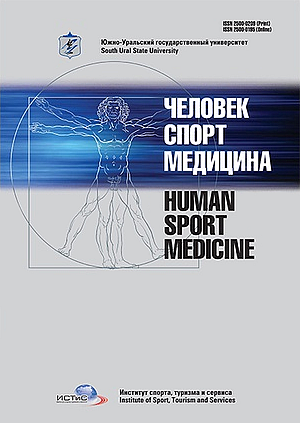PSYCHOLOGICAL AND PEDAGOGICAL CONDITIONS OF FORMING THE SPORT MOTIVATION IN YOUNG VOLLEYBALL PLAYERS
Abstract
Aim. To determine psychological and pedagogical conditions of forming the sport motivation in young volleyball players. High sport performance closely is associated with personal motivation sphere. Motivation is not only a core characteristics of the athlete which leads him/her to the desired goal, but also influences the specifics of all processes in the human body when an individual is engaged in some kind of activity. Teachers, coaches, and athletes tend to underestimate the role of motivation factors and to ignore the dynamics of changes in motives which results in impossibility to fulfill one’s potential in sporting activity. Research organization and methods. The study involved 15-16-year-old volleyball players. The athletes were aware of application of suggestion and persuasion methods and informed of the necessary emotional attitude to the stated conditions (at the level of goals, motives, and conations) which leads to high sport performance (the effect of the top-down mechanism). Results. Sport motivation should be developed from external organization when the stated attitude is formed and becomes actual mainly under the influence of the social environment, and is associated with the specifics of the exact situation, to internal organization associated with the personal features of an athlete: temperament, motives to go in for sports, and abilities to perform subjective self-control. Conclusion. It has been established that the control of forming the sport motivation in the process of extra-training, training and competitive activity requires day-to-day creation of pedagogical conditions for formation, functioning, and stabilization of the stated attitude by means of psychological mechanisms “bottom-up” and “top-down”. Keywords: motive, sport motivation, sporting activity, personal features, claim levels.References
1. Piloyan R.A. Motivatsiya sportivnoy deyatel'nosti [Motivation Sports Activities]. Moscow, Physical Education and Sports Publ., 1984. 112 p. 2. Baturin N.A. Psikhologiya uspekha i neudachi v sportivnoy deyatel'nosti [Psychology of Success and Failure in Sport]. Chelyabinsk, 1988. 86 p. 3. Rodionov A.V. Vliyanie psikhologicheskikh faktorov na sportivnyy rezul'tat [The Impact of Psychological Factors On Athletic Performance]. Moscow, Physical Education and Sports Publ., 1983. 112 p. 4. Kuz'min E.B., Drandrov G.L. [Mental Readiness of Young Volleyball Players to the Sport of High Achievements]. Vestnik UGTU-UPI. Seriya “Obrazovanie i vospitanie. Ekonomika i upravlenie fizicheskoy kul'tury i sporta” [Herald of Ural State Technical University. A Series of Education and Upbringing. Economy and Management of Physical Culture and Sport], 2006, no. 10 (81), iss. 6, vol. 2, pp. 40–47. (in Russ.) 5. Kozin V.V., Geras'kin A.A., Rоdionov A.V. [Theory and Practice of the Activity Approach to the Training of Sportsmen in Game Kinds]. Omskiy nauchnyy vestnik [Scientific Herald of Omsk], 2014, no. 1 (125), pp. 167–173. (in Russ.) Human. Sport. Medicine 2016, vol. 1, no. 1, pp. 82–87 6. Babushkin G.D., Babushkin E.G. Formirovanie sportivnoy motivatsii [Formation of Sports Motivation]. Omsk, 2000. 179 p. 7. Shaboltas A.V., Zhukov D.A. [Risk Behavior as a Reaction to Uncontrolled Stress]. Vestnik SPbGU. Seriya 12: Pedagogika, psikhologiya, sotsiologiya [Bulletin of St. Petersburg State University. Episode 12. Pedagogy, Psychology, Sociology], 2011, iss. 1, pp. 227–234. (in Russ.) 8. Stepanskiy V.I. [The Relation Between Achievement Motive of Avoiding Failure And]. Voprosy psikhologii [Questions of Psychology], 1981, no. 2, pp. 25–32. (in Russ.) 9. Gorbunov G.D. Psikhopedagogika sporta [Psycho Sports]. Moscow, Physical Education and Sports Publ., 1986. 208 p. 10. Il'in E.P. Psikhofiziologiya fizicheskogo vospitaniya [Psychophysiology of Physical Education]. Moscow, Education Publ., 1980. 199 p.
References on translit
Published
2016-02-01
How to Cite
Kuzmin, E., Denisenko, Y., Akhmetov, A., Chukhno, P., & Andruschishin, I. (2016). PSYCHOLOGICAL AND PEDAGOGICAL CONDITIONS OF FORMING THE SPORT MOTIVATION IN YOUNG VOLLEYBALL PLAYERS. Human. Sport. Medicine, 16(1), 82-87. https://doi.org/10.14529/hsm160114
Issue
Section
Brief communications
Copyright (c) 2019 Human. Sport. Medicine

This work is licensed under a Creative Commons Attribution-NonCommercial-NoDerivatives 4.0 International License.















